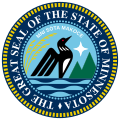| |||||||||||||||||
| |||||||||||||||||
| |||||||||||||||||
The 1859 Minnesota Attorney General election was held on October 11, 1859, in order to elect the attorney general of Minnesota. Republican nominee Gordon E. Cole defeated Democratic nominee and former Mayor of Saint Paul John B. Brisbin. [1]
| |||||||||||||||||
| |||||||||||||||||
| |||||||||||||||||
| Elections in Minnesota |
|---|
 |
The 1859 Minnesota Attorney General election was held on October 11, 1859, in order to elect the attorney general of Minnesota. Republican nominee Gordon E. Cole defeated Democratic nominee and former Mayor of Saint Paul John B. Brisbin. [1]
On election day, October 11, 1859, Republican nominee Gordon E. Cole won the election by a margin of 3,556 votes against his opponent Democratic nominee John B. Brisbin, thereby gaining Republican control over the office of attorney general. Cole was sworn in as the 2nd attorney general of Minnesota on January 2, 1860. [2]
| Party | Candidate | Votes | % | |
|---|---|---|---|---|
| Republican | Gordon E. Cole | 21,186 | 54.58 | |
| Democratic | John B. Brisbin | 17,630 | 45.42 | |
| Total votes | 38,816 | 100.00 | ||
| Republican gain from Democratic | ||||